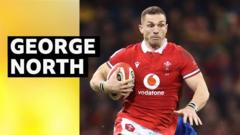What Does George North Say About Concussions and the Future of Welsh Rugby?

Published: 2025-09-10 13:32:08 | Category: sport
In a recent interview, former Welsh rugby star George North opened up about the intense pressure he faced following multiple concussions during his career. He shared insights into the challenges of recovery, the impact of head injuries on players, and his thoughts on the future of Welsh rugby, highlighting the need for improved safety measures and support for athletes.
Last updated: 01 October 2023 (BST)
Understanding Concussion in Rugby
Concussions are a serious concern in rugby union, a sport known for its physicality and contact. A concussion is defined as a brain injury caused by a blow to the head or body, leading to a disruption in normal brain function. Rugby union has been under scrutiny regarding its handling of concussion protocols, and North's experiences shed light on the real pressures players face.
Key Takeaways on Concussion and Player Welfare
- Concussions can have long-term effects on players' health.
- There is growing awareness about the importance of concussion protocols.
- Players often feel pressured to return to the field despite injury.
- Support systems for players are crucial for recovery.
- The future of rugby may depend on adopting stricter safety measures.
The Pressure of Performance
North described the overwhelming pressure athletes face to perform at their best, irrespective of their health. This pressure is often compounded by the expectations from fans, coaches, and the media. He noted that many players feel compelled to play through injuries, including concussions, fearing that their position on the team could be jeopardised.
The Impact of Concussions on Players
Concussions can lead to a range of symptoms, including headaches, confusion, dizziness, and difficulty concentrating. For rugby players, these symptoms can severely impact their performance and quality of life. North's personal journey through recovery highlights the emotional and physical toll that such injuries can take.
Current Concussion Protocols in Rugby
Rugby union has established protocols aimed at managing concussions effectively. These protocols include:
- Immediate Assessment: Players suspected of having a concussion are assessed on the field by medical personnel.
- Return to Play Guidelines: Players must undergo a graduated return-to-play process once they are symptom-free.
- Education: Increasing awareness among players, coaches, and officials about the signs and risks of concussions.
Despite these measures, North points out that there is still significant room for improvement in how concussions are managed within the sport.
What’s New in Concussion Management?
Recent discussions among rugby unions suggest an evolving approach to concussion management. Innovations include:
- Utilising advanced technology for real-time monitoring of players' health.
- Collaboration with neuroscientists to better understand the impacts of repeated head injuries.
- Enhanced training for coaches and referees on identifying potential concussion symptoms.
These advancements aim to create a safer playing environment, but North emphasises that cultural shifts within the sport are equally important.
The Future of Welsh Rugby
George North also addressed the future of Welsh rugby, expressing optimism about the potential for growth and development. He believes that focusing on player welfare, including mental health and physical safety, is crucial for the sport's sustainability. Investing in grassroots initiatives and nurturing young talent will be vital as Wales strives to remain competitive on the international stage.
Challenges Ahead for Welsh Rugby
Welsh rugby faces several challenges, including financial constraints and the need for strategic changes at the administrative level. There is a pressing need for:
- Increased funding for player development programmes.
- Stronger support for mental health initiatives.
- Encouragement of diversity within the sport to attract a broader audience.
By addressing these areas, Welsh rugby can build a brighter future while ensuring that player safety remains a top priority.
Conclusion
George North's insights into the pressures of rugby and the realities of concussion management highlight a critical need for change within the sport. As rugby continues to evolve, prioritising player welfare and safety will be essential for its future. The conversation around concussions is growing, and it is imperative for all stakeholders to engage in creating a safer environment for players at all levels.
How can rugby unions further enhance safety measures to protect players? This question remains crucial as the sport looks to the future. #RugbySafety #WelshRugby #ConcussionAwareness
FAQs
What is a concussion?
A concussion is a type of brain injury caused by a blow to the head or body, leading to temporary disruption of normal brain function and symptoms like headaches or confusion.
How are concussions managed in rugby?
Concussions in rugby are managed through immediate assessment by medical professionals, strict return-to-play guidelines, and ongoing education for players and coaches about concussion risks.
What are the long-term effects of concussions?
Long-term effects of concussions can include chronic headaches, cognitive difficulties, mood changes, and in some cases, conditions like Chronic Traumatic Encephalopathy (CTE).
What changes are being made to improve player safety in rugby?
Improvements include advanced monitoring technologies, collaborations with neuroscientists, and enhanced training for coaches and referees on identifying concussion symptoms.
Why is player welfare important for the future of rugby?
Player welfare is crucial for the future of rugby as it ensures the health and safety of athletes, fostering a sustainable environment that attracts players and fans alike.



